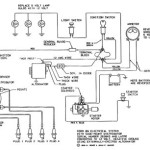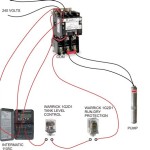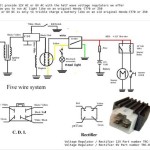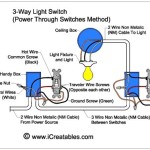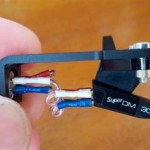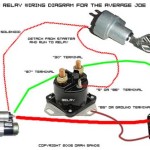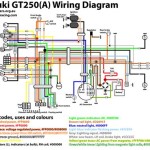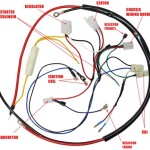Car wiring harness connectors, often abbreviated as “connectors,” are devices that facilitate electrical connections between different components of a vehicle’s wiring system. They are used to join wires securely and efficiently, providing a reliable and organized method for distributing power and signals throughout the vehicle. An example of a wiring harness connector is the one used to connect the battery to the vehicle’s starter motor.
Connectors play a crucial role in ensuring the safe and proper functioning of a vehicle’s electrical system. They provide a reliable connection that minimizes electrical resistance and prevents short circuits. The use of standardized connectors simplifies the assembly and maintenance of vehicle wiring systems, making it easier to troubleshoot and repair electrical issues.
A significant historical development in the field of car wiring harness connectors was the introduction of modular designs. Modular connectors allow for the easy addition or removal of individual circuits or components, providing greater flexibility and adaptability in vehicle wiring systems. This modular approach has revolutionized the way vehicles are wired, enabling the integration of new technologies and features with relative ease.
In the following sections, we will delve deeper into the types, functions, and applications of car wiring harness connectors, exploring their importance in the design and operation of modern vehicles.
Car wiring harness connectors are essential components of a vehicle’s electrical system, playing a crucial role in connecting and distributing power and signals throughout the vehicle. Understanding the various aspects of car wiring harness connectors is important for comprehending their functions, applications, and overall impact on vehicle performance and safety.
- Types: Various types exist, including modular, sealed, and quick-disconnect.
- Functions: Facilitate electrical connections between different components.
- Materials: Typically made of durable materials like plastic, metal, and rubber.
- Durability: Designed to withstand harsh environmental conditions and vibrations.
- Standardization: Adhere to industry standards for ease of use and interchangeability.
- Safety: Ensure reliable connections to prevent electrical hazards.
- Flexibility: Modular designs allow for easy addition or removal of circuits.
- Cost-effectiveness: Streamline assembly and maintenance, reducing labor costs.
- Reliability: High-quality connectors minimize electrical resistance and prevent malfunctions.
- Customization: Available in various configurations to meet specific vehicle requirements.
These aspects collectively contribute to the effectiveness and efficiency of car wiring harness connectors. Their durability and reliability ensure uninterrupted electrical connections, while their standardization and flexibility simplify vehicle assembly and maintenance. Moreover, the cost-effectiveness and customization options make them a practical solution for a wide range of vehicle applications.
Types
Car wiring harness connectors come in a variety of types, each with its own unique characteristics and applications. Understanding the different types of connectors is essential for selecting the right connector for the job.
- Modular connectors: Modular connectors are designed to be easily assembled and disassembled, allowing for the addition or removal of individual circuits or components. This makes them ideal for use in applications where flexibility and adaptability are important.
- Sealed connectors: Sealed connectors are designed to protect against the ingress of moisture and other contaminants. They are typically used in applications where the connector will be exposed to harsh environmental conditions, such as under the hood of a vehicle.
- Quick-disconnect connectors: Quick-disconnect connectors are designed to allow for quick and easy disconnection of electrical circuits. They are typically used in applications where frequent disconnection is required, such as for diagnostic purposes or for connecting and disconnecting trailers.
- Other types of connectors: In addition to the three main types of connectors listed above, there are also a number of other types of connectors available, each with its own unique set of features and applications. These other types of connectors include heavy-duty connectors, high-voltage connectors, and low-profile connectors.
The different types of car wiring harness connectors offer a wide range of options to meet the specific needs of a particular application. By understanding the different types of connectors available, it is possible to select the right connector for the job, ensuring a reliable and efficient electrical connection.
Functions
The primary function of car wiring harness connectors is to facilitate electrical connections between different components of a vehicle’s electrical system. This is achieved through the use of conductive terminals that are housed within the connector housing. When two connectors are mated, the terminals make contact, allowing current to flow between the two components.
The ability of car wiring harness connectors to facilitate electrical connections is critical to the proper functioning of a vehicle’s electrical system. Without these connectors, it would be impossible to connect the various electrical components that make up the system, such as the battery, alternator, starter motor, and lights. As a result, the vehicle would not be able to start or operate.
There are many different types of car wiring harness connectors, each designed for a specific purpose. Some of the most common types include:
- Modular connectors: These connectors are designed to be easily assembled and disassembled, allowing for the addition or removal of individual circuits or components. This makes them ideal for use in applications where flexibility and adaptability are important.
- Sealed connectors: These connectors are designed to protect against the ingress of moisture and other contaminants. They are typically used in applications where the connector will be exposed to harsh environmental conditions, such as under the hood of a vehicle.
- Quick-disconnect connectors: These connectors are designed to allow for quick and easy disconnection of electrical circuits. They are typically used in applications where frequent disconnection is required, such as for diagnostic purposes or for connecting and disconnecting trailers.
The understanding of the function of car wiring harness connectors in facilitating electrical connections is essential for the design, assembly, and maintenance of vehicle electrical systems. By ensuring that the correct connectors are used for the job, it is possible to create a reliable and efficient electrical system that will meet the demands of the vehicle.
Materials
The materials used in the construction of car wiring harness connectors play a critical role in ensuring their durability, reliability, and performance. These connectors are typically made of a combination of durable materials, including plastic, metal, and rubber, each of which offers unique properties that contribute to the overall functionality of the connector.
- Connector Housing: The connector housing is typically made of a durable plastic material, such as nylon or polycarbonate. This material provides electrical insulation, protects the terminals from damage, and ensures a secure connection between the two connectors.
- Terminals: The terminals are the conductive elements of the connector and are typically made of a metal alloy, such as copper or brass. These materials provide excellent electrical conductivity and are resistant to corrosion.
- Seals and Grommets: Seals and grommets are used to protect the connector from the ingress of moisture and other contaminants. These components are typically made of rubber or a similar elastomeric material and provide a watertight seal around the connector housing.
- Strain Relief: Strain relief is used to prevent the wires from being pulled out of the connector due to excessive force. This component is typically made of a flexible rubber or plastic material and provides a secure grip on the wires.
The combination of these durable materials ensures that car wiring harness connectors can withstand the harsh environmental conditions and mechanical stresses encountered in automotive applications. These connectors are designed to provide a reliable and long-lasting electrical connection, contributing to the overall safety and performance of the vehicle.
Durability
The durability of car wiring harness connectors is of paramount importance in ensuring the reliable and safe operation of vehicles. These connectors are subjected to a wide range of harsh environmental conditions, including extreme temperatures, moisture, vibration, and exposure to chemicals. To withstand these challenges, car wiring harness connectors are designed and manufactured to meet stringent durability standards.
The durability of car wiring harness connectors is achieved through the use of high-quality materials and robust construction techniques. The connector housings are typically made of durable plastic materials, such as nylon or polycarbonate, which provide electrical insulation and protection from mechanical damage. The terminals are made of corrosion-resistant metal alloys, such as copper or brass, to ensure reliable electrical conductivity. Seals and grommets made of rubber or elastomeric materials provide a watertight seal to prevent the ingress of moisture and contaminants.
The practical applications of durable car wiring harness connectors are evident in various automotive systems. For example, under the hood of a vehicle, these connectors are used to connect critical components such as the engine control unit, sensors, and actuators. They must withstand the extreme heat and vibration generated by the engine while maintaining reliable electrical connections. Similarly, in automotive lighting systems, wiring harness connectors are exposed to moisture and road debris, and their durability ensures uninterrupted operation of headlights, taillights, and other lighting components.
In summary, the durability of car wiring harness connectors is a critical factor in ensuring the safety and reliability of vehicles. By understanding the importance of durability and the design principles employed to achieve it, engineers and technicians can select and use the appropriate connectors for specific applications, contributing to the overall performance and longevity of automotive electrical systems.
Standardization
Within the realm of car wiring harness connectors, standardization plays a pivotal role in ensuring ease of use and interchangeability, streamlining the assembly, maintenance, and repair processes. Adhering to industry standards guarantees compatibility between connectors from different manufacturers, reducing the risk of mismatches and facilitating seamless integration.
- Universal Compatibility: Industry standards define the physical dimensions, terminal arrangements, and electrical specifications of connectors, ensuring that they can be mated with any other connector that conforms to the same standard, regardless of the manufacturer. This interchangeability simplifies the procurement and replacement of connectors, reducing downtime and maintenance costs.
- Simplified Assembly: Standardized connectors feature consistent designs that allow for quick and efficient assembly. The use of standardized tools and procedures ensures proper mating and secure connections, minimizing the risk of errors and increasing overall reliability.
- Reduced Complexity: Standardization reduces the number of different connector types required for a particular application, simplifying inventory management and lowering procurement costs. By limiting the variety of connectors, manufacturers can focus on producing high-quality, standardized products that meet industry demands.
- Enhanced Safety: Adherence to industry standards ensures that connectors meet specific safety requirements, such as electrical insulation and flame retardancy. Standardized testing procedures verify that connectors perform as intended, minimizing the risk of electrical hazards and ensuring the safety of vehicle occupants and technicians.
In conclusion, the standardization of car wiring harness connectors brings numerous benefits, including universal compatibility, simplified assembly, reduced complexity, and enhanced safety. By adhering to industry standards, manufacturers and technicians can streamline the design, production, and maintenance of automotive electrical systems, contributing to the overall efficiency, reliability, and safety of vehicles.
Safety
In the context of car wiring harness connectors, safety is paramount. Reliable connections are essential to prevent electrical hazards that could compromise the vehicle’s functionality, endanger passengers, and cause significant damage. Car wiring harness connectors play a crucial role in ensuring these reliable connections.
Electrical hazards can arise from loose or faulty connections, leading to short circuits, overheating, and even fires. Reliable connections established through properly designed and manufactured car wiring harness connectors minimize these risks. Robust construction, durable materials, and stringent quality control measures ensure that connectors maintain their integrity under various operating conditions, including exposure to vibration, temperature fluctuations, and moisture.
Real-life examples underscore the importance of safety in car wiring harness connectors. A poorly connected wire harness could lead to intermittent electrical issues, such as flickering lights or malfunctioning components. More severe cases may result in a loss of critical functions like engine control or braking systems, potentially leading to accidents. By ensuring reliable connections, car wiring harness connectors contribute to the overall safety and reliability of the vehicle.
Understanding the connection between safety and car wiring harness connectors has practical applications in various industries. In the automotive sector, manufacturers prioritize the use of high-quality connectors that meet strict safety standards. This commitment extends to the aftermarket, where reliable connectors are essential for maintaining vehicle safety during repairs and modifications. Additionally, industries such as aerospace and defense demand robust and reliable connectors to ensure the safe operation of critical systems.
In conclusion, the connection between safety and car wiring harness connectors highlights the importance of reliable electrical connections in preventing electrical hazards. By ensuring secure and stable connections, these connectors contribute to the overall safety and functionality of vehicles and play a vital role in various industries where safety is paramount.
Flexibility
Within the realm of car wiring harness connectors, flexibility plays a crucial role in accommodating evolving electrical requirements and simplifying maintenance procedures. Modular designs, a hallmark of modern connectors, empower engineers with the ability to easily add or remove circuits, providing a level of adaptability that is essential in the dynamic automotive industry.
The cause-and-effect relationship between flexibility and car wiring harness connectors is evident in the following aspects:
- Adaptability to Changing Needs: Modular connectors enable the addition of new circuits or the removal of obsolete ones as vehicle designs and technologies evolve. This flexibility caters to the ever-changing demands of automotive electronics, ensuring that wiring harnesses can be tailored to specific vehicle configurations and feature sets.
- Simplified Maintenance and Repairs: When electrical issues arise, modular connectors facilitate the quick and efficient replacement of faulty circuits. Technicians can isolate and remove individual circuits without the need to overhaul the entire wiring harness, reducing repair times and costs.
Real-life examples showcase the practical significance of flexibility in car wiring harness connectors:
- Upgrading Audio Systems: As aftermarket audio systems gain popularity, modular connectors allow for easy integration of new speakers, amplifiers, and subwoofers. Enthusiasts can customize their audio experience without the hassle of rewiring the entire harness.
- Accessory Installations: The addition of accessories like navigation systems, backup cameras, and remote starters is made simpler with modular connectors. Technicians can tap into existing circuits or add new ones to power these accessories without compromising the integrity of the main wiring harness.
In summary, the flexibility offered by modular designs in car wiring harness connectors is a critical component in meeting the evolving needs of automotive electrical systems. It provides adaptability to changing technologies, streamlines maintenance and repairs, and enables the seamless integration of new features and accessories. Understanding this connection empowers engineers, technicians, and enthusiasts to design, maintain, and enhance vehicle electrical systems with greater efficiency and flexibility.
Cost-effectiveness
In the realm of “Car Wiring Harness Connectors,” cost-effectiveness is a crucial aspect that directly impacts the efficiency and profitability of automotive production and maintenance. It encompasses various strategies and practices that streamline assembly and maintenance processes, leading to significant reductions in labor costs and overall expenses.
- Standardized Designs: Utilizing standardized connector designs across different vehicle models and platforms enables manufacturers to leverage economies of scale, reducing production costs and simplifying inventory management.
- Modular Construction: Employing modular connectors allows for faster and simpler assembly, as pre-assembled modules can be easily integrated into the wiring harness, reducing labor time and associated costs.
- Simplified Maintenance: Connectors designed for quick and easy disconnect facilitate maintenance and repair procedures, minimizing downtime and the need for specialized tools or training, thereby reducing labor expenses.
- Reduced Rewiring: Reliable and durable connectors minimize the likelihood of electrical faults and the need for extensive rewiring, resulting in cost savings on labor and materials.
The cost-effectiveness of “Car Wiring Harness Connectors” extends beyond direct labor cost reductions. The streamlined assembly and maintenance processes contribute to increased production efficiency, reduced vehicle downtime, and enhanced overall profitability for manufacturers and service providers alike. Understanding and implementing cost-effective practices in this area is essential for optimizing the production and maintenance of automotive electrical systems.
Reliability
In the context of “Car Wiring Harness Connectors,” reliability is of paramount importance. A reliable connection ensures uninterrupted flow of electrical signals, preventing malfunctions and maintaining optimal performance of the vehicle’s electrical system. High-quality connectors are meticulously engineered to minimize electrical resistance and prevent malfunctions, serving as the backbone of a robust and dependable wiring harness.
The relationship between reliability and car wiring harness connectors is evident in the following cause-and-effect scenario:
- Electrical Resistance: Faulty or low-quality connectors can introduce electrical resistance into the circuit, impeding the flow of current. This resistance can lead to voltage drops, power loss, and overheating, potentially causing component failures and malfunctions.
- Preventing Malfunctions: High-quality connectors are designed to maintain low electrical resistance, ensuring efficient current flow. By preventing excessive resistance, these connectors minimize the risk of malfunctions, ensuring the proper operation of electrical components and systems.
Real-life examples underscore the significance of reliability in car wiring harness connectors. Consider the following scenarios:
- Engine Control Unit (ECU): Reliable connectors are crucial for the proper functioning of the ECU, which manages critical engine functions such as fuel injection and ignition timing. Faulty connectors can disrupt communication between the ECU and other components, leading to engine performance issues or even stalling.
- Lighting Systems: High-quality connectors ensure that headlights, taillights, and other lighting components receive adequate power. Poor connections can result in dim or flickering lights, compromising visibility and safety during nighttime driving.
Understanding the connection between reliability and car wiring harness connectors has practical applications in the automotive industry and beyond. Manufacturers prioritize the use of high-quality connectors to ensure the reliability and longevity of their vehicles. Technicians rely on durable and reliable connectors to efficiently diagnose and repair electrical issues. Moreover, industries such as aerospace and defense demand robust connectors to maintain the safety and reliability of critical systems.
In summary, the reliability of car wiring harness connectors is a fundamental aspect that ensures the smooth functioning of electrical systems. High-quality connectors effectively minimize electrical resistance and prevent malfunctions, contributing to the overall safety, performance, and longevity of vehicles. Understanding this connection empowers engineers, technicians, and enthusiasts to make informed decisions when selecting and using connectors, ultimately enhancing the reliability and efficiency of electrical systems in various industries.
Customization
Car wiring harness connectors are designed to meet the specific requirements of different vehicle models and configurations. Customization is achieved through variations in connector design, size, shape, and terminal arrangements. This customization ensures that the connectors can seamlessly integrate with the electrical systems of various vehicles, accommodating unique design constraints and functional needs.
The cause-and-effect relationship between customization and car wiring harness connectors is evident in the following aspects:
- Compatibility: Customized connectors ensure compatibility with specific vehicle electrical systems, enabling proper electrical connections and data transmission.
- Space Optimization: Customized connectors can be designed to fit into tight spaces, optimizing the layout of electrical components and maximizing available space.
- Performance Enhancement: Connectors tailored to specific vehicle requirements can optimize electrical performance, minimizing signal loss and ensuring reliable operation.
Real-life examples of customization in car wiring harness connectors include:
- Engine Control Units (ECUs): ECU connectors are customized to match the specific pin configurations and communication protocols of different engine management systems.
- Body Control Modules (BCMs): BCM connectors are tailored to accommodate the varying number and types of electrical inputs and outputs found in different vehicle models.
- Advanced Driver Assistance Systems (ADAS): ADAS sensors and actuators require customized connectors to meet the specific data transmission and power requirements of each system.
Understanding the connection between customization and car wiring harness connectors has practical applications in the automotive industry and beyond. Manufacturers leverage customization to streamline vehicle production by creating connectors that are specifically designed for each vehicle model. Technicians rely on customized connectors to ensure proper fit and functionality during repairs and modifications. Moreover, the ability to customize connectors enables the integration of new technologies and features into existing vehicle platforms, extending their lifespan and capabilities.
In summary, customization is a critical aspect of car wiring harness connectors, allowing them to meet the unique requirements of different vehicles and applications. Customized connectors ensure compatibility, optimize space utilization, and enhance electrical performance, contributing to the overall efficiency, reliability, and safety of automotive electrical systems.










Related Posts

